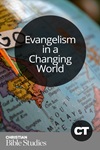When it comes to sharing the gospel today, many of us feel somewhat apathetic or insecure. One reason for this deficit is the absence of a clear and accurate picture of the role that the Christian mission and people like us have played in the great sweep of history.
This quest for the truth becomes more urgent in light of the particular version of history being advanced by a variety of articulate atheists or "anti-theists" today. They assert that a serious study of the past demonstrates that Christianity—along with other religious beliefs—is not benevolent, or merely benign, but actually bad. It is antiquated, superstitious and ultimately destructive. It is responsible for incalculable bloodshed, unforgivable injustice and mind-numbing ignorance. Far from being a blessing to human civilization, "faith" has been a blight to human advancement. In a debate with Alister E. McGrath, Christopher Hitchens summed up the conclusion this way: "I can't believe there is a thinking person here who doesn't realize that our species would begin to grow to something like its full height … if it emancipated itself from this sinister, childish [religious] nonsense."
Although this opinion is being peddled with fresh packaging today it is hardly new. This view of history first gained prominence back in the late 18th century with the widespread reading of Edward Gibbon's book The History of the Decline and Fall of the Roman Empire. Gibbon caricatured Christianity as having brought down the grandeur of classical civilization—fettering the human spirit and the life of the mind to which Greece and Rome gave birth. As Christianity expanded, says Gibbon, it weakened the Roman Empire, paving the way for the church to take over and subject the Western world to its superstitions and regressive rules.
As this storyline goes, the church went on to ban books, suppress science and womanhood, and plunge once noble Europe into the Dark Ages. Bent on taxing people to fund their material and moral excesses, the church's leadership crusaded across the Middle Ages, skewering infidels, racking skeptics and burning dissidents. Thankfully, however, some courageous intellectuals finally revolted against the church's Darth Vader-like grip and birthed the Renaissance. They followed it up with the magnificent Enlightenment, staving back blind religion. In time, thank Man's goodness, these bright thinkers managed to invent the modern era and bring us to the present moment when—if with John Lennon we dare to imagine—we can be free of the Christian disease once and for all and enter a new age of progress and peace. In fact, we would have had that better world a whole lot earlier if that Easter hoax had never happened.
This is what is being taught as "history." Can you see why people steeped in this tale might be resistant to the Christian message or discouraged about sharing it with others?
The Enemy Is Partly Right
As we'll see, however, this storyline is quite a revision of history. Before going there, however, it would serve God's reputation and our credibility well to make the same confession once voiced by Tony Campolo: "We have met the enemy and they are partly right." Jesus once said that only the truth can set us fully free to be his people (John 8:32). The painful truth is that atheism has a foothold today in part because there have been many times in history when people of Christian faith (or marching beneath some other religion's flag) have sinned boldly against God and people. Whether by ignorance, pride, greed or some other deadly sin, they have repeated the very atrocities by which ostensibly religious people crucified Jesus because he threatened their institutional power or personal throne.
Over the centuries, Christians have at times been racially, sexually, politically and socially bigoted in ways contrary to the full counsel of Scripture. We have sometimes looked to our own interests more than to the character of Christ or the needs of the world God so loves. We have justified our actions by selective reading of the Bible. If we've grown up believing that the Christian church or our Christian nation or anything other than Christ himself is substantially holier than everyone else, then the attacks of contemporary atheists are actually God's good gift. They invite us to recall that we too need the Savior and that he is not done renovating our lives.
At the same time, if we allow the antitheist's rewriting of history to stand unchallenged, we will sacrifice truth, imperil the future and cripple our ability to present the evangelistic witness still so needed in our day. To paraphrase Max DePree's famous maxim about leadership: "The first responsibility of a witness is to define reality." Here, then, is the larger reality that is the true context for our witness and the greater story into which God is drawing you.
Reclaiming History
As the witnesses of Jesus began to spread out from Jerusalem in the middle of the first century, Roman civilization was already on the rocks. It was nothing like the Golden Society that Edward Gibbon so romantically pictures. Roman culture was morally wasting, ravaged by political divisions and scandalized by widespread slavery, the commonly accepted abuse of children, and a widening gap between the haves and the never-would-haves. When the Huns, Goths and other northern tribes finally poured down into the heart of Europe they found a society so soft and rotting that they sliced through it like a laser through an overripe tomato. It was not the church but Roman decadence and barbarian pillaging which created the Dark Ages.
People today are routinely taught that it was the support of the Roman Empire under Constantine that led to the explosive growth of Christianity. In reality, however, it was the collapse of that Empire that unleashed the church to play the strategic role God had for it in this part of history. As Dinesh D'Souza observes, "Slowly and surely, Christianity took this backward continent and gave it learning and order, stability and dignity." Bit by bit, the distinctive beliefs and practices of Christ's followers began the profound reshaping of Western civilization.
Learning and literature. Because Christians believed that Christ was Lord of all the earth and that God had left the stamp of his eternal nature in the heart of all people (Ecclesiastes 3:11), Christian monks highly valued what was left of classical civilization, particularly its arts and letters. As Thomas Cahill has documented well, the monks studied, copied and hid away the manuscripts that preserved the learning of late antiquity—saving for us the remaining treasures of Greece and Rome.
Commerce and capitalism. Because Christian theology held that God was the divine Logos (John 1:1-5)—the great mind that brought intelligent structure and order out of chaos—Christian monasteries became radiant centers of organized community and personal industry throughout Europe. They applied biblical principles of private property, civic stewardship and limited government to a world that had largely lost these values. Out of the wasteland of the Dark Ages, Christians produced hamlets, towns and eventually cities. The principles of commerce and elected leadership practiced in those monastic communities created the foundation for capitalism and democratic society as we know them today.
Dignity and charity. Steadily, the Christian missionary movement stretched out, converting the Northern European barbarian hordes, the Angles and Saxons, and the tribes of Scotland, Ireland, and Wales. Warriors gradually became knights, infused now with new ideals of civility and chivalry that still inform our society. Because Jesus honored women and valued children, the developing civilization of Europe began to take on his imprint in these ways, albeit imperfectly, but to an extent utterly foreign to other cultures of that time and to many in ours today. Because Jesus had said: "Whatever you do for one of the least—the poor, the imprisoned, the sick—you do for me" (Matthew 25:31-46, my paraphrase), Christ's followers showed concern for the weak and the marginalized. They developed innumerable hospitals, orphanages, and other centers of charity, again, to an extent unknown before on planet Earth.
Science and higher education. Other religions, including the classic Greek and Roman ones, held that the gods (and therefore the movements of nature) were capricious or unknowable. But Christians believed that God was rational and had given human beings minds to discover his glory in the created order. Episodes of regression aside, Christianity was indisputably the world's most massive sponsor of the scientific enterprise and the academic culture that fostered it. The Christian passion for the pursuit of truth led to the establishment of an untold number of schools and universities. Go study the inscriptions carved into the stones of the Western world's greatest institutions of higher education and you will be thunderstruck by the prevalence of the biblical imprint there.
The modern world. Yale professor Jaroslav Pelikan remarks that Jesus of Nazareth has been the dominant figure in the history of Western culture for almost 20 centuries. If it were possible, with some sort of super magnet, to pull up out of that history every scrap of metal bearing at least a trace of his name, how much would be left? In his book The Victory of Reason, Stark answers that question: Had the followers of Jesus remained an obscure Jewish sect, most of you would not have learned to read and the rest of you would be reading from hand-copied scrolls. Without a theology committed to reason, progress, and moral equality, today the entire world would be about where non-European societies were in 1800. It would be, Stark says, a world with many astrologers and alchemists but no scientists … a world of despots, lacking universities, banks, factories, eyeglasses, chimneys, and pianos … a world where most infants do not live to the age of five and many women die in childbirth. The modern world arose only in Christian societies. Not in Islam. Not in Asia. Not in a "secular" society.
There would be no world as we know it today if Easter had never happened.
What Is God Doing Today?
As the writer of Hebrews asserted, Christ calls his witnesses to present God's message of hope despite all opposition (Hebrews 12:3). Today we face an articulate and assertive army of anti-theists who are deeply embedded in our academic institutions and who trumpet their worldview even through the organs of entertainment. They declare that if we could just leave religion behind and build instead on the innate genius and goodness of humanity, we would have a better world.
That "noble experiment," however, has already been tried. It was conducted with great intentionality in Russia, China and Korea during the 20th century and led to the starvation, slaughter and suppression of millions of lives. Yet people in those same parts of the world are now flocking into house churches, refurbished cathedrals, corporate offices and storefront worship centers by the tens of millions, passionately seeking the generative seed of the Christian gospel. After nearly a century of state-sponsored atheism in Russia, 74 percent of the population now self-identifies as Christian. In 1900, Korea had no Protestant church and was ruled "impossible to penetrate" by mission organizations. Today, there are 7,000 churches in the city of Seoul alone, one of them numbering 750,000 members.
At the turn of the 19th century, the southern portion of the African continent was only 3 percent Christian. Today, 63 percent of the population is, while membership in the churches of Africa is increasing by 34,000 new members every day.
In Hindu India, 14 million of the 140 million members of the "untouchable" caste have become Christians. More people in the Islamic world have come to Christ in the last 25 years than in the entire history of Christian missions combined.
In Islamic Indonesia, the percentage of Christians is now so high (somewhere around 15 percent) and the number of megachurches is growing so quickly that the Muslim government will no longer print the statistics.
Back in 1950, there were only a handful of evangelical Christians in Brazil. Today, more than one-fifth of the population self-identifies as Protestant. The Catholic Church in Brazil has experienced a profound revival too, going from 50 million adherents in 1950 to more than 134 million today.
All the talk these days is of the coming influence of China. Yet, as two writers from the Economist recently asserted, there are now more self-avowed disciples of Jesus in China than members of the Communist party. David Aikman of the New York Times points out that every year there are ten million more converts to Christianity. Even the most conservative estimates suggest that China will soon become the largest Christian country in the world.
Much is also made of the global expansion of Islam, but Christianity—not Islam—is the fastest-spreading faith on earth. By 2050, there will be three Christians for every two Muslims worldwide.
Across the planet, followers of Jesus are increasing by more than eighty thousand disciples a day. Five hundred and ten new congregations of Christian worshipers form every day, which is 3,750 every week. The irony is that, except for the Middle East (where it was born) and Europe and America (to whose civilization it gave birth), Christianity is expanding everywhere today (see John 4:44). To put it simply, the gospel of Jesus is going out and growing up.
Join in the Spread
It is essential to remember all this as we begin to think afresh about our work as witnesses today. Without this larger perspective, it is easy for those of us who live in places where the gospel message is not apparently prospering to think that the human heart is just too hard and the heat of opposition just too blazing for the work of Christian witness to succeed in our times. We can be tempted to withdraw into a private piety and give up the dream of life-changing influence on others. But God has not given up his plan to extend his kingdom in the community where you live (Jerusalem), the region where you work (Judea), the areas you try to avoid (Samaria), and to the very ends of the earth (Acts 1:8). As John Piper remarks,
God is pursuing with omnipotent passion a worldwide purpose of gathering joyful worshipers for Himself from every tribe and tongue and people and nation. He has an inexhaustible enthusiasm for the supremacy of His name among the nations. Therefore, let us bring our affections into line with His, and, for the sake of His name, let us … join His global purpose.
You are not a beleaguered minority up against impossible forces. You are a privileged member of the greatest movement in history and the only one that will be around in the end (Revelation 22). Christ has promised to supply you with the power to do this work and, as history shows, Jesus always keeps his promises—even the most outrageous ones.
So, fix your eyes on Jesus, the author and perfecter of our faith. Keep considering him so you don't lose heart. Run with perseverance the good race marked out for you (Hebrews 12:2-3). Let's go forward on this journey together by examining next the content of the message we seek to sow and learning why it is such very good news.
Adapted from Witness Essentials by Daniel Meyer (IVP). Used by permission of InterVarsity Press PO Box 1400 Downers Grove, IL 60515. www.ivpress.com.
Copyright © 2012 by Christianity Today/ChristianBibleStudies.com. Click here for reprint information.












